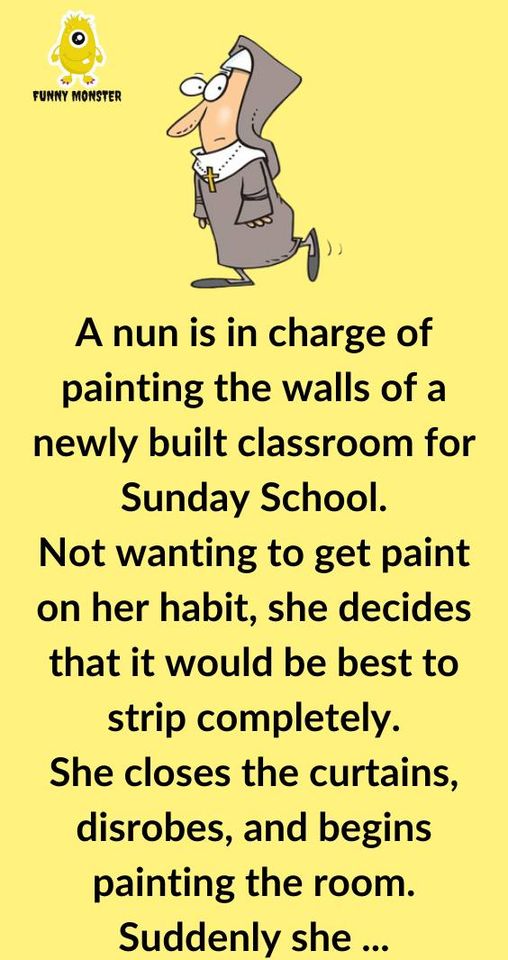A nun was tasked with painting the walls of a newly constructed classroom for Sunday School.
To avoid getting paint on her habit, she decided the best solution was to strip completely.
After closing the curtains, she disrobed and started painting. Suddenly, there was a knock at the door.
“Who is it?” she called out.
“Blind man,” came the reply.
Thinking there was no harm in letting a blind man enter, she opened the door and let him in.
The man walked in, looked around, and said,
“Great! I’m here to install the blinds.”
This joke belongs to the category of classic anecdotes with an unexpected twist, designed to amuse through misunderstandings and double meanings. The humor here hinges on the play on words and the situation where the nun misinterprets the phrase “blind man.” Expecting someone who literally cannot see, she feels entirely secure in her vulnerable state, believing there’s no risk in being seen while painting in the nude.

The punchline delivers the twist: the “blind man” wasn’t blind in the literal sense but was instead there to install window blinds. This sudden realization flips the situation on its head, making it both absurd and funny. The humor also plays on the nun’s innocence and the stark contrast between her assumption and the reality, creating a memorable and lighthearted moment.
In conclusion, this joke is a masterful example of how humor can be derived from simple misunderstandings and clever wordplay. Its brilliance lies in the unexpected twist that completely overturns the initial assumption of the nun—and, by extension, the listener. The setup leads us to believe one thing, only for the punchline to reveal a completely different reality, catching us off guard and eliciting laughter.
The joke also subtly highlights themes of innocence and naivety. The nun’s assumption reflects her trust and lack of suspicion, which makes the twist even more impactful. At the same time, the humor is light and inoffensive, relying on situational irony rather than malice or exaggeration. The use of a play on words—confusing “blind” as a physical condition with its meaning in the context of window blinds—adds a clever layer of linguistic humor that resonates universally.
What makes this joke particularly memorable is how it draws humor from an everyday scenario. The situation is relatable—who hasn’t misunderstood something based on incomplete information? Yet, it escalates in an exaggerated way, combining familiarity with absurdity. This juxtaposition keeps the humor sharp and timeless, making it a classic anecdote that continues to entertain audiences across cultures and generations.

Ultimately, the joke’s structure, simplicity, and clever twist make it an excellent example of how humor can be crafted to entertain while also gently poking fun at our assumptions and the quirks of human nature.
This joke stands out because it showcases how our assumptions can lead to humorous misunderstandings. The nun’s confidence in her decision to open the door reflects a trusting and innocent perspective, which adds to the comedic effect when the truth is revealed. The twist also emphasizes the importance of context in communication, as a single word like “blind” can have entirely different meanings. By creating a situation where the audience shares the nun’s assumption, the joke draws listeners into the humor and makes the punchline more impactful. Its universal appeal lies in its simplicity and clever wordplay, making it a timeless piece of humor.














